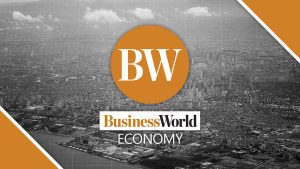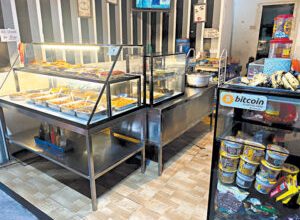Inflation may breach 9% in Feb. — BSP

A vendor arranges eggs in boxes at a store along Blumentritt in Manila. Prices of eggs continued to increase in February, which may have contributed to faster inflation. — PHILIPPINE STAR/WALTER BOLLOZOS
By Keisha B. Ta-asan, Reporter
HEADLINE INFLATION may have breached the 9% level in February, amid higher prices of cooking gas, pork, fish, and eggs, the Bangko Sentral ng Pilipinas (BSP) said on Tuesday.
In a statement, the BSP said February inflation likely settled within the 8.5% to 9.3% range in February. This would follow January’s 8.7% print, which was the quickest since November 2008.
If realized, February would mark the 11th straight month that inflation would exceed the BSP’s 2-4% target range.
The upper end of the forecast or 9.3% would be the fastest pace recorded in more than 14 years or since the 9.7% recorded in October 2008.
“Upward price pressures for the month are expected to emanate from higher LPG (liquefied petroleum gas) prices as well as elevated prices of key food items, such as pork, fish, egg, and sugar,” the BSP said in a statement.
Cooking gas prices increased by P10.00-11.20 per kilogram in February, while the price of eggs rose to P8-9 per piece from P6 a year ago.
Refined sugar prices reached as high as P110 per kilogram in February, nearly double the P65 per kilogram seen a year ago.
“Meanwhile, the lower prices for domestic petroleum, fruits and vegetables, chicken, and beef, along with the peso appreciation could contribute to easing price pressures during the month,” the central bank said.
In February alone, pump price adjustments stood at a net decrease of P0.50 a liter for gasoline, P5.45 a liter for diesel and P6.85 a liter for kerosene.
The peso depreciated by 1.25% or P0.69 in February, closing the month at P55.33 against the dollar on Tuesday from its P54.64 close on Jan. 31.
Elevated inflation will put more pressure on the central bank to continue its aggressive monetary tightening.
BSP Governor Felipe M. Medalla said the Monetary Board may continue to hike policy rates to tame inflation.
“We cannot rule out (rate) increases. Exactly how many, we don’t know. We need more data,” Mr. Medalla told BusinessWorld on the sidelines of the House Appropriations Committee hearing on Tuesday.
The BSP raised its benchmark interest rate by 50 basis points (bps) at its first policy meeting of the year, bringing the key benchmark rate to 6%, the highest in nearly 16 years.
Since May 2022, the BSP has raised policy rates by a total of 400 bps.
“I think there is room for a few more (rate hikes) that will not affect growth. Because our calculation is (that for) every 25-bp rate increase, the impact on growth is 0.01-0.02%, so (our 6-7% growth target is) achievable,” Mr. Medalla said.
“(However,) if you take a longer view that’s no longer the case. Most of the increases don’t have to be necessarily permanent,” he added, indicating that a policy rate cut is possible in the long term.
Mr. Medalla earlier said the Monetary Board is considering an interest rate hike by 25-50 bps at its March meeting.
BSP Senior Assistant Governor Iluminada T. Sicat said February inflation is “still elevated” and the central bank will “make use of all available tools in order to stabilize and bring back inflation trend back to the target range.”
“Inflation for some of these vegetables is still high… We’ve already seen prices are going down. Probably by March, you can see some improvement in the inflation path,” Ms. Sicat told reporters on the sidelines of an economic forum in Makati City.
“We are expecting inflation to come down by October (and be) within target. Hopefully, there are no more shocks coming,” she added.
The BSP sees inflation averaging 6.1% this year, before easing to 3.1% in 2024.
“The BSP will continue to adjust its monetary policy stance as necessary to prevent the further broadening of price pressures as well as the emergence of additional second order effects,” the central bank said in Tuesday’s statement, adding it will closely monitor emerging price developments.
UNCERTAINTYMeanwhile, the International Monetary Fund (IMF) said the BSP may need to tighten policy further this year to tame inflation and keep inflation expectations under control.
“The BSP has taken prompt action to tackle inflation and continued near-term tightening of monetary policy is appropriate to keep inflation expectations well-anchored,” IMF Representative to the Philippines Ragnar Gudmundsson said at the same economic forum on Tuesday.
Mr. Gudmundsson also sees the US Federal Reserve to continue policy tightening by another 50 bps or more this year before pausing.
He said the Philippine consumer price index (CPI) may moderate this year, but there is still some uncertainty as to when inflation will peak.
“The risk to inflation exists and they consist of higher commodity prices following China’s reopening, the war in Russia-Ukraine, weather disturbances, and higher wage increases,” Mr. Gudmundsson said.
The IMF expects Philippine inflation to average 4.7% in 2023, lower than the actual 5.8% price growth in 2022 and the 6.1% forecast of the BSP.
In a text message, Mr. Gudmundsson said the BSP may hike borrowing costs by 25 bps or 50 bps more this year, bringing the key rate to a peak of 6.5% this year.
“This is subject to change, based on evolving conditions, but most likely another 25 or 50 basis points,” he said.
The Monetary Board is set to review policy on March 23. — with inputs from Beatriz Marie D. Cruz




